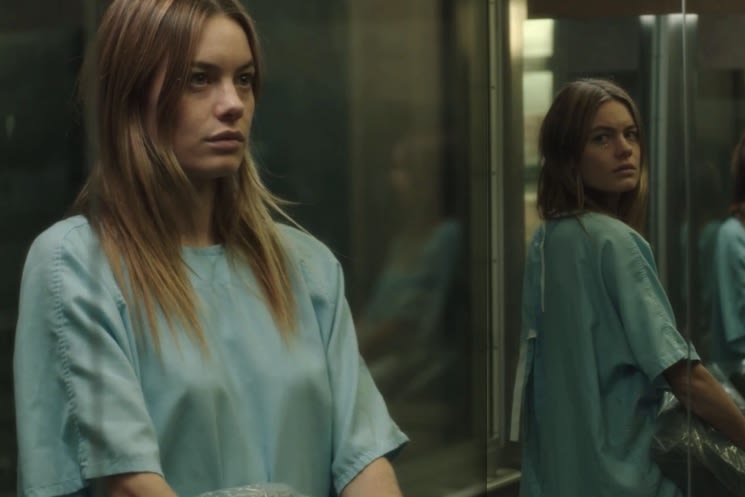Writer and director Jefferson Moneo says the inspiration for Cosmic Dawn came from his own childhood, when he encountered an extraterrestrial and no one believed his story — much like the film's main character. Through the film, Moneo plays out a reality where his experiences are validated in an '80s stylized sci-fi indie packed with solid performances from his cast.
The film begins in 1997, with a mother and daughter enjoying a camping trip studying the stars and the moon. Bright lights fill the night sky, and mom disappears. As an adult, Aurora (Camille Rowe) is haunted by her memories of extraterrestrials taking her mom away, and being forced onto medication from a young age.
In a chance meeting (or maybe cosmic intervention) at a bookstore, Natalie (Emmanuelle Chriqui) invites Aurora to join her and her friends for a night out. Aurora is hesitant but ultimately decides to attend, and finds herself being welcomed into a group called the Cosmic Dawn, led by their leader Elyse (Antonia Zegers).The group is made up of individuals who all have similar stories to Aurora, whether they witnessed an encounter or were abducted themselves.
Moneo tells Aurora's story through two timelines: one in the film's present, and another four years after. In both, we see Natalie's husband Tom (Joshua Burge) attempt to draw Aurora into his trust. And while the jumping between time periods can be disorienting at times, it keeps the audience engaged and neatly brings the narrative arc to a close.
Rowe turns in a dynamic performance as Aurora. She distinguishes between past and future Aurora effectively, and gives Aurora a multidimensional personality. But it's Chriqui who shines brightest. As the beguiling Natalie, Chriqui brings subtle depth and mystery, enhancing Cosmic Dawn's commentary on cults and mental health.
Moneo introduces a lot of themes, and though Cosmic Dawn's ending is definitive, his exploration of these themes are not. Perhaps owing to his own experiences as a child, Moneo lends his opinions without presenting them as authority. There's a feeling that Moneo is trying to convince us of his encounter — or, at the very least, the film's audiences to open their minds that such encounters are possible. It's an interesting through-line that colours and, at times, augments the film.
Cosmic Dawn is heavily styled in an '80s aesthetic. From the title cards to the music and cosmic effects (for lack of a better term), Moneo uses a Memphis-esque design as a pop of brightness to an otherwise lacklustre modern palette. The result is a duality of vibes: '80s cult fun and the contrasting stark reality of today. The partnership works well, emphasizing the superficial benefits cults promise its followers.
A movie that genre lovers will find engaging, Cosmic Dawn makes good use of its low budget, and is boosted by some nice performances by its cast members, especially Rowe and Chriqui.
(Cranked Up)The film begins in 1997, with a mother and daughter enjoying a camping trip studying the stars and the moon. Bright lights fill the night sky, and mom disappears. As an adult, Aurora (Camille Rowe) is haunted by her memories of extraterrestrials taking her mom away, and being forced onto medication from a young age.
In a chance meeting (or maybe cosmic intervention) at a bookstore, Natalie (Emmanuelle Chriqui) invites Aurora to join her and her friends for a night out. Aurora is hesitant but ultimately decides to attend, and finds herself being welcomed into a group called the Cosmic Dawn, led by their leader Elyse (Antonia Zegers).The group is made up of individuals who all have similar stories to Aurora, whether they witnessed an encounter or were abducted themselves.
Moneo tells Aurora's story through two timelines: one in the film's present, and another four years after. In both, we see Natalie's husband Tom (Joshua Burge) attempt to draw Aurora into his trust. And while the jumping between time periods can be disorienting at times, it keeps the audience engaged and neatly brings the narrative arc to a close.
Rowe turns in a dynamic performance as Aurora. She distinguishes between past and future Aurora effectively, and gives Aurora a multidimensional personality. But it's Chriqui who shines brightest. As the beguiling Natalie, Chriqui brings subtle depth and mystery, enhancing Cosmic Dawn's commentary on cults and mental health.
Moneo introduces a lot of themes, and though Cosmic Dawn's ending is definitive, his exploration of these themes are not. Perhaps owing to his own experiences as a child, Moneo lends his opinions without presenting them as authority. There's a feeling that Moneo is trying to convince us of his encounter — or, at the very least, the film's audiences to open their minds that such encounters are possible. It's an interesting through-line that colours and, at times, augments the film.
Cosmic Dawn is heavily styled in an '80s aesthetic. From the title cards to the music and cosmic effects (for lack of a better term), Moneo uses a Memphis-esque design as a pop of brightness to an otherwise lacklustre modern palette. The result is a duality of vibes: '80s cult fun and the contrasting stark reality of today. The partnership works well, emphasizing the superficial benefits cults promise its followers.
A movie that genre lovers will find engaging, Cosmic Dawn makes good use of its low budget, and is boosted by some nice performances by its cast members, especially Rowe and Chriqui.
